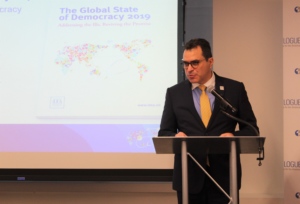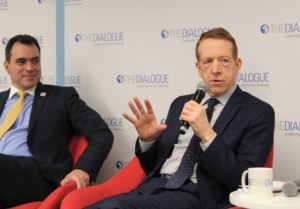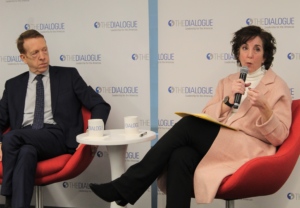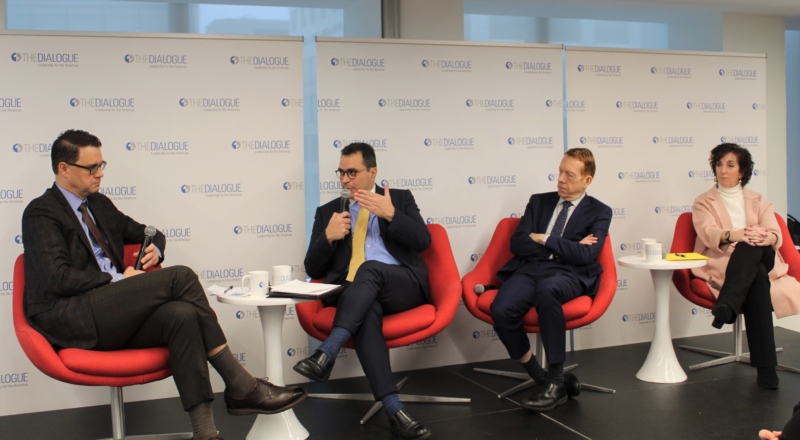The Washington Post & the OAS Secretary General
The OAS needs to be reformed, but the changes need to emerge from accurate analysis of the problems confronting both Latin America and the OAS.
On December 13, 2019 the Inter-American Dialogue, in partnership with International Institute for Democracy and Election Assistance (IDEA) and the International Foundation for Electoral Systems (IFES), hosted “Is Democracy in Trouble? Latin America in Global Perspective”, an event to launch IDEA’s The Global State of Democracy 2019 Report: Addressing the Ills, Reviving the Promise. The event began with welcome and introductory remarks by Michael Shifter, president of the Inter-American Dialogue, and Anthony Banbury, president of the International Foundation for Electoral Systems. The event featured a presentation of The Global State of Democracy 2019 Report by Kevin Casas-Zamora, secretary-general of International IDEA, followed by a panel including Thomas Carothers, senior vice-president for studies at the Carnegie Endowment for International Peace, and Roberta Jacobson, senior advisor at Albright Stonebridge Group & former US Ambassador to Mexico. The panel was moderated by Michael Sveltlik, vice president, programs at IFES.
Banbury began the discussion by stating that the report addresses the reasons behind the recent shifts democracy is experiencing worldwide. With a rapidly changing world, societies are forced to confront old challenges as well as new threats that are much more pervasive and severe. He commended the IDEA report, acknowledging that it is not sufficient to say that the problems at hand are difficult. There is a need to use innovative tools to protect and advance democracy.
[caption id="attachment_90832" align="alignleft" width="300"] Kevin Casas-Zamora[/caption]
Kevin Casas-Zamora[/caption]
Casas-Zamora presented the key findings of the report. IDEA analysts used 97 variables of political performance for 158 countries, spanning from 1975-2018. Five attributes of democracy were mentioned in his presentation: representative government, participatory engagement, impartial administration, checks on government, and fundamental rights. Some findings were encouraging—the world is more democratic now than it has ever been before, the number of democracies in the world has tripled since 1975. Now more than half of the world’s population live in a democracy. Democracies are being found in countries that had never experienced it before, and 81 percent of democracies born since 1975 have continued uninterrupted.
At the same time, the report did reveal some challenges. The quality of democracy is declining, with the percentage of “weak” democracies increasing from 20 to 25 percent. The report also found that civic spaces are shrinking across all regions and most countries analyzed demonstrated insufficient progress in three areas: corruption, gender equality, and judicial independence. Despite this, Latin America is the region in he world where the most democracies have advanced in the past forty years. Two key findings of the report that were focused on were support for democracy has significantly diminished and that the perception of political unfairness is increasing.
[caption id="attachment_90835" align="alignright" width="300"] Thomas Carothers[/caption]
Thomas Carothers[/caption]
In the discussion of the report, Carothers cautioned against having a pessimistic view of its findings. He articulated that the report balances a measured level of alarm with a complex analysis of the different types and qualities of democracies there are. He then explained common and distinctive features of the Latin American and Caribbean (LAC) region in regard to democracy. Globally, many states are experiencing high levels of civil discontent and polarization. However, the LAC region is experiencing a heavy dose of left-wing populism and still experiences the overhang of military dictatorships of decades past.
[caption id="attachment_90838" align="alignleft" width="300"] Roberta Jacobson[/caption]
Roberta Jacobson[/caption]
Jacobson commended the report for going beyond the assumptions that elections are indicators of democracies. She believes that the growing discontent with democracy is due to the poor quality of democracies that citizens are facing around the globe. One of the most critical findings for her was the fact that civic spaces are shrinking, which can be seen in the increased criticism of NGOs, the press, and civil society worldwide.
During the Q&A, the audience asked questions regarding the how the reality of narcotrafficking threatens democracy, what the citizen’s role is in managing a decline in the strength of the judicial system, and
how to preserve democracy before a coup or stolen election.
The OAS needs to be reformed, but the changes need to emerge from accurate analysis of the problems confronting both Latin America and the OAS.
By all accounts, Spain wants to bring change to the European Union’s Cuba policy. In so doing, it is tackling a foreign policy challenge that often sheds more heat than light.
Although politics has cyclical features, and ideology is sometimes a factor in choices made by Latin American voters, the left-right labels obscure more than they illuminate.
 Irene Estefanía González | Inter-American Dialogue
Irene Estefanía González | Inter-American Dialogue